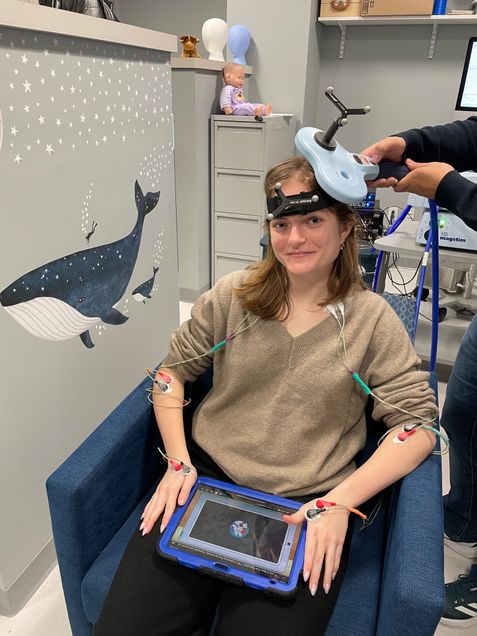6-18 years old
Please fill out this form if you would like to participate in one of our studies: Participation Survey You can also contact us for more information: demrlab@bu.edu | 617-353-7492
What do we study?
We study how the pathways in the brain that control the hands and arms are organized. We want to know how these patterns relate to the way children use their hands and arms when performing movements. The purpose of this study is to understand how the brain develops, or changes following an early brain injury. Our goal is to use this information to develop future hand therapies for children with cerebral palsy.

What does participation in a study involve?
1 study visit to the Cognitive Neuroimaging Center at Boston University (located across the street from our laboratory)
AND
1 study visit to our laboratory: the Development, Experience, & Motor Recovery Lab at Boston University.
The visits will take place on different days and last 1 – 2 hours each.
What will visit 1 include?
- Magnetic Resonance Imaging (MRI): This is a device that uses a magnetic field to create a picture of the brain. During the MRI, we will ask your child to lie still on a table that slides into a tunnel-shaped machine. Your child will be able to hear and speak to the research staff at all times and we can stop at any time. The MRI will take about 60 minutes during which your child will watch a movie or show.
- Assisting Hand Assessment: Your child will play a game requiring them to interact with a number of toys ranging in size, shape, and texture. This assessment will take approximately 15 minutes and be videotaped.
- Grip Force Assessment: Your child will hold on to a handheld device called a dynamometer that can measure the amount of force they can produce when squeezing the device with their hands. They will be asked to squeeze the device while seated at a table at a comfortable height while resting their arms on the surface in front of them. This section will last approximately 40 minutes.
What will visit 2 include?
- Transcranial Magnetic Stimulation (TMS): We will measure brain areas that control movement by using a painless and non-invasive brain stimulation technique. A very brief magnetic field is placed over the scalp, using a wand that looks like a figure 8. Your child will be seated comfortably at a chair with a pillow in their lap and allowed to watch a child-friendly movie during the assessment. We will use TMS on both sides of the brain to make a “brain map” of the areas of the brain that control each of your child’s arms and hands. This measurement will take approximately 75 minutes.
- Functional near-infrared Spectroscopy (fNIRS): We will also measure your child’s brain activity using a technique known as functional near-infrared spectroscopy (fNIRS). We will place a soft, cloth cap that holds light sources and detectors (which we call “optodes”) onto your child’s head. This device allows us to use light to measure your child’s brain activity. Your child will wear the cap while performing grasping movements of wooden blocks. This does not hurt or create any sensation, except for slight application of pressure to temporarily connect the optodes.
How can I get more information or sign up to participate?
You can contact us by phone (617-353-7492), or email (demrlab@bu.edu). We are located on BU’s Charles River Campus at 635 Commonwealth Ave., and a short 5-minute walk from the Blandford St T-stop or BU East T-stop on the Green Line.
Map:
View Larger Map